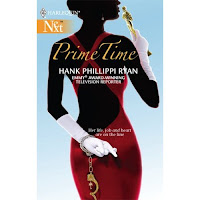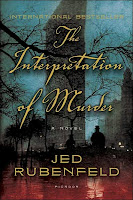STATUS: Why am I blogging at 10 p.m. at night? Because I’m nuts, that’s why!
What’s playing on the iPod right now? WHO WANTS TO LIVE FOREVER by Queen
Now I find it interesting that back cover copy is often hard to find on both Amazon.com and B&N.com. The sites will often list reviews, personal commentary, even a bit of a synopsis but the back cover copy is often missing. In fact, sometimes you can’t find it unless you use the Search Inside feature so you can see flap copy or the like.
Considering how much time is spent on the pitch—by aspiring writers, by the agent when it comes time to sell it, by the editor who is pitching it to ed. board and then to sales reps at Sales Conference, and then reps to the booksellers, both these online sites almost eschew using the copy…
What am I saying? I don’t know. It’s too late to really analyze what I’m saying but it’s interesting to note.
And today’s entry was a must in light of the terrific news I get to share. My author Hank Phillippi Ryan has won the 2007 Agatha for best first book for her debut mystery/women’s fiction hybrid PRIME TIME.

How cool is that? Out of all the mysteries published last year, only four were nominated and she won. And in even cooler news, MIRA is going to rerelease this title, plus the second book and two other new books in the series for some Summer 2009 back-to-back fun.
So this leads me into an example for a genre that I don’t really represent but I have to say that if I had gotten a query letter with this kind of pitch blurb, I would have said to heck with what I rep, this sounds like something I want to see.

The Interpretation of Murder by Jed Rubenfeld
On the morning after Sigmund Freud arrives in New York on his first – and only- visit to the United States, a stunning debutante is found bound and strangled in her penthouse apartment, high above Broadway. The following night, another beautiful heiress, Nora Acton, is discovered tied to a chandelier in her parents’ home, viciously wounded and unable to speak or to recall her ordeal. Soon Freud and his American disciple, Stratham Younger, are enlisted to help Miss Acton recover her memory, and to piece together the killer’s identity. It is a riddle that will test their skills to the limit, and lead them on a thrilling journey – into the darkest places of the city, and of the human mind.
Okay, you know the drill. Find the plot catalyst. Then analyze what is used to build the pitch paragraph.
There is certainly an economy of words with this example. Four sentences total. Hit me with it and then tomorrow we can talk about it. Does it work? Why?
We could also talk about whether it doesn’t but for me, that’s not really all that important. If it doesn’t work for you, then you won’t be picking up this book nor if you were an agent, would it be up your alley either. This biz is all about personal opinion after all. Not much to learn from that. However, the publisher believed this short, and to-the-point copy would work. It’s up to us to try and figure out why as we demystify the pitch.

Off-topic question (I tried to find the answer in your archives, but no luck): With authors like Hank Phillippi Ryan (much congrats there, BTW), do you find that it’s more difficult to sell women’s fic (and/or romance) with an author’s name that’s not automatically recognizable as a woman’s (to publishers and in stores)?
Even when I include my middle name (Rebecca) on documents such as résumés, people still assume ‘Jordan’ is a man. Would it be a good idea to include my full middle name in queries, or is this one of those things that don’t really matter?
Congratulations to you and Ms. Ryan. From all the good things happening, it looks like that fortune teller in New York may have been right. I hope so.
Here’s a corporation joke for you:
Q: Why doesn’t the corporation do things that way?
A: Because it would work.
Here’s what I see in the pitch:
Nora Acton’s mental state, and the coincidence of the arrival of the world’s greatest authority on mental states is the catalyst. The fact that it is his first and only visit to the United States places certain limits on Freud and imports a hint of urgency. Beautiful, rich, young women are abused and in danger. (OMG! Is Paris in peril?) The choice of the word ‘disciple’ adds dimension to Freud’s mystique and depth to the scope of the story. ‘Test their skills’ tell us the plot is complex and clever. The ‘thrilling journey’ promises variety and action, while the darkest places in the city suggest danger and ‘of the human mind’ brings up mystery and (considering all those damaged young beauties) the distinct possibility of something really naughty, if not downright kinky.
Four sentences, very tight, well written. The way the last line rolls out on the tongue is like old radio drama — “into the darkest places of the city, and of the human mind.” Neat.
the plot catalyst is Freud becoming involved in the investigation and recovery of Nora Acton.
What is interesting to me is that this pitch relies very heavily on the reader filling in the blanks with her own knowledge of Freud. If it was just “Harry Walker”, then the pitch would be pretty boiler-plate murder mystery, without any hook.
It’s not a major revelation, just that it’s nice that the writer realized that and took advantage of it when writing the pitch.
Catalyst? Freud involved in in crime solving. It would be interesting to watch Freud try to figure this out. I might pick this book up. I think it gives a twist to a regular who done it.
Catalyst… see above.
To me this seems standard and cliche. “Thrilling journey – into the darkest places of the city and of the human mind.” That’s been done before, a lot. The only novelty this offers is Freud and to appreciate the story you have to 1) know who Freud is and 2) like Freud enough to read several hundred pages about him.
What might grab my attention is the same story pitched from the villians perspective. Matching wits with Freud like Moriarty and Holmes, that might pique my curiosity. Otherwise, this is just another dead-heiress book.
O/T Amazon hint: if you don’t see the back cover copy on the main page — they refer to it as the “Product Description” — click on the “See all Editorial Reviews” link.
I use this trick all the time to help me write annotated booklists.
Looking forward to reading Prime Time. Congratulations!
The plot catalyst is the wounding of Nora Action and the fact she can’t recall her ordeal. The fact that Freud and his disciple get involved is one part of the pitch paragraph, what the find in the depths of the city and the human mind is the other.
I think the plot catalyst is Freud arriving in the United States. Nothing else would happen in this particular book without that one occurence.
The rest of the copy is like a plot stream with identifying characters. What/who, what/who, who/what.
I think what makes it work is Freud, strange violence and mystery. Also the copy makes it clear (although the inclusion of Freud does this as well) that this book is a psychological thriller.
I don’t read books like this, but I’d sure as hell see the movie!
Congrats on your award-winning authors — all of them.
Wow, congratulations to Hank!
I’m being lazy and not analyzing the blurbs, even though I submitted one. I’m trying to keep my head in my book.
Yay Prime Time!!! I think I was the very very very first reader of the book. Hank would bring chapters into work as she wrote them and my friend Mary and I would bring them home to read and then bug her for more the next day. It was obvious, even then, that the book was a winner! I’m glad the Agatha people are smart enough to realize it, too.
Oh and as for Amazon, it takes two seconds for the author to upload his/her back cover copy if the publisher hasn’t done it for them. I don’t know why more authors don’t bother doing it. They could also upload reviews, bios, sample chapters – whatever they feel will help sell the book.
The plot catalyst is the first “stunning debutante” who is found bound and strangled in her penthouse precisely on the morning of Freud’s arrival, thus the question is do we have a killer who wants to toy with Freud? By Wiki, I think we do. I think we also have a killer who wants to outwit, outplay and outlast Dr. Freud.
To build on this, we have Freud in New York–(which is the set-up), and then we have another victim (Nora), and because Nora is still alive, yet so traumatized that she can’t speak, we can tie her to Freud via his American disciple who will probably consult with zee goot doctor while penetrating the pysche of the killer’s mind. But I could be wrong.
Congratulations to you and Hank on the Agatha! I can’t wait to read it.
It sounds so totally intriguing! But I just have one question: instead of helping the heiress, can Freud leave her dangling from the chandelier? In fact, can the whole book be about Freud murdering and/or torturing rich spoiled people for the amusement of the poor? He could be tripped out on cocaine or something. If you go that route, I’ll read it!
Honestly, with so many people just struggling to get by, do you really think anyone cares about debutantes? This is what’s wrong with publishing; it’s in its own world. It can’t even be called escapist. To be escapist, it’d have to know what it was escaping from.
That’s why some of us read historical fiction in the first place–to get out of the troubles of our own time, and participate in someone else’s. Isn’t the grass always greener?
My take.